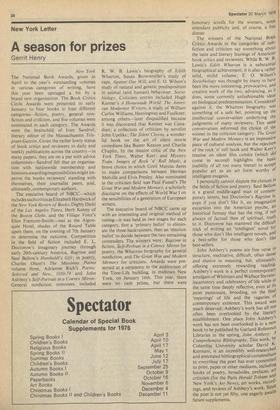A season for prizes
Gerrit Henry
New York The National Book Awards, given in April to the year's outstanding volumes in various categories of writing, have this year been upstaged a bit by a brand new organisation. The Book Critics Circle Awards were presented in early January to four books in four different categories—fiction, poetry, general nonfiction and criticism, and five volumes were nominated in each category. The Awards were the brainchild of Ivan Sandrof, literary editor of the Massachusetts Telegram-Gazette. Given the rather lowly status of book critics and reviewers in daily and weekly publications across the country—in many papers, they are on a par with advice columnists—Sandrof felt that an organisation with nationwide membership and honours-awarding responsibilities might improve the books reviewers' standing with themselves, their journalist peers, and, ultimately, contemporary authors.
The executive board of NBCC—which includes such critics as Elizabeth Hardwick of the New York Review of Books, Digbly Diehl of the Los Angeles Times, Herb Kenny of the Boston Globe, and the Village Voice's Eliot Fremont-Smith—met at the Algonquin Hotel, shades of the Round Table upon them, on the evening of 7th January to determine the outcome. Competition in the field of fiction included E. L. Doctorow's imaginary journey through early 20th-century America, Ragtime and Saul Bellow's Humboldt's Gift; in poetry, Charles Olson's The Maximus Poems volume three, Adrienne Rich's Poems: Selected and New, 1950-74 and John Ashbery's Self-Portrait in a Convex Mirror. General nonfiction nominees included R. W. B. Lewis's biography of Edith Wharton, Susan Brownmiller's study of rape, Against Our Will, and E. 0. Wilson's study of natural and genetic predisposition in animal (and human) behaviour, Sociobiology. Criticism entries included Hugh Kenner's ,4 Homemade World: The American Modernist Writers, a study of William Carlos Williams, Hemingway and Faulkner, among others—later disqualified because it was discovered that Kenner was Canadian; a collection of criticism by novelist John Updike; The Silent Clowns, a wonderful book on the art of silent movie comedians like Buster Keaton and Charlie Chaplin, by the theatre critic of the New York Times, Walter Kerr: and Mystery Train: Images of Rock 'n' Roll Music, a brave choice in which Greil Marcus dares to make comparisons between Herman Melville and Elvis Presley. Also nominated in the criticism field was Paul Fussel's The Great War and Modern Memory, a scholarly discourse on the effects of World War I on the sensibilities of a generation of European writers.
The executive board of NBCC came up with an interesting and original method of voting—it was held in two stages for each category, first a 'primary ballot' to eliminate the three backrunners, then an 'election ballot' to decide between the two remaining contenders. The winners were: Ragtime in fiction, Self-Portrait in a Convex Mirror for poetry, the Wharton biography for general nonfiction, and The Great War and Modern Memory for criticism. Awards were presented at a ceremony in the auditorium of the Time-Life building, in midtown New York, on January 16th. This year, there were no cash prizes, but there were honorary scrolls for the winners, some attendant publicity and, of course, a free dinner.
The winners of the National Book Critics Awards in the categories of non
fiction and criticism say something about the taste and literary leanings of American book critics and reviewers. While R. W. B.
Lewis's Edith Wharton is a substantial biographical achievement, it is also a rather solid, stolid volume; E. 0. Wilson's Sociobiology was thought by many to have been the more interesting, provocative, and creative work of the two, advancing, as it does, some currently unfashionable ideas on biological predetermination. Considered against it, the Wharton biography was something of a safe bet, pointing up the intellectual convervatism underlying the judgments of many reviewers. This same convervatism informed the choice of the winner in the criticism category: The Great War and Modern Memory is an impressive piece of cultural analysis, but the rejection of the rock 'n' roll book and Walter Kerr's treatise on silent film comics (which did come in second) highlights the basic inability of all too many literati to accept popular art as an art form worthy of intelligent exegesis.
I personally cannot dispute the choices in the fields of fiction and poetry. Saul Bellow is a grand middle-aged man of contemporary letters, but DoctorOw's Ragtime is, even if you don't like it, an imaginative excursion into the American psyche, an historical fantasy that has the ring, if not always of factual then of spiritual, truth to it. Doctorow has mastered the difficult trick of writing an 'intelligent' novel for those who don't like intelligent novels, and a best-seller for those who don't like best-sellers.
John Ashbery's poems are free verse in structure, meditative, difficult, often dense and elusive in meaning, but, ultimately, offering extremely rewarding reading. Ashbery's work is a perfect contemporarY amalgam of Whitman and Wallace Stevens: incantatory and celebratory of life while at the same time deeply reflective, even at its most passionate, brooding, on the final 'meanings' of life and the vagaries of contemporary existence. This award was much deserved: Ashbery's work has all too often been overlooked by the literarY establishment. One place John Ashbery s work has not been overlooked is in a new book to be published by Garland Reference Libraries in the spring, John Ashbery: A Comprehensive Bibliography. This work, hY Columbia University scholar David K. Kermani, is an incredibly well-researched and annotated bibliographical compendiuM to everything the poet has ever committed to print, paper or other mediums, including books of poetry, broadsides, prefaces, art criticism (for the Paris Herald Tribune and New York's Art News), art works, recordings, and reviews of Ashbery's work. Since the poet is not yet fifty, one eagerly awaits future supplements.


































 Previous page
Previous page